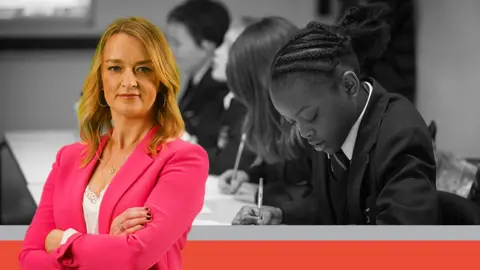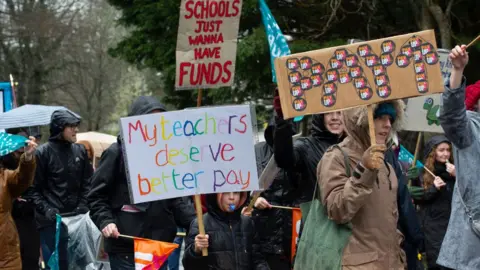Laura Kuenssberg: What is really going on in our schools?
 BBC/Getty Images
BBC/Getty ImagesYou pack the kids off in the morning hoping not just that they have remembered their PE kit, but they'll spend a happy day in a safe place where they will learn something useful.
An excellent education can completely change a child's life. A poor one can be a waste of opportunity or worse.
For the first time in a while there's the beginnings of vigorous political debate about what is going on in our classrooms, and according to many different sources I've talked to in the last few days, it isn't pretty.
One senior school leader told me "everyone is cross about everything, all of the time". Another senior figure said "they'd never seen the sector so miserable".
But what is really going on?
The death of a much loved teacher, Ruth Perry, has shone a light on England's education watchdog Ofsted.
Her family blames it for what happened to Ruth - who took her own life - after the primary school in Caversham, Berkshire, she loved and led was to be downgraded from "outstanding" to "inadequate".
Ofsted has said its thoughts are with Ms Perry's family and has described her death as a tragedy, while the Department for Education offered its "deep condolences" and was providing support to the school.
But as our education editor Branwen Jeffreys has written here, the tragedy of a single family has led to an outpouring of concern about Ofsted.
There are countless stories of stress and anxiety for teachers prompted by the inspection regime. But faith in the education system also matters to parents, the wider public, politicians and most importantly children themselves.
On this Sunday's show we'll hear for the first time since Ruth Perry's death from Amanda Spielman, the Chief Inspector of Schools for England - and there's a lot to talk about.
Thirty years after it was set up by the Conservatives in 1992, Ofsted still prompts a combination of fear and mockery from teachers.
In those early years it didn't exactly get off on the right foot with the profession. Chris Woodhead, the second and notoriously outspoken Ofsted boss, even said there were 15,000 incompetent teachers who should get the sack.
Maybe it's not surprising that education often finds fault with the inspector that judges it. After all, no-one wants to be best friends with the referee.

What is Ofsted?
Ofsted, the Office for Standards in Education, Children's Services and Skills, inspects and reports on anywhere that provides education for young people in England - including schools, nurseries and childminders.
Schools or organisations are inspected every four years or 30 months depending on their status, and are then graded accordingly:
- 1 - outstanding
- 2 - good
- 3 - requires improvement
- 4 - inadequate
Many parents rely on Ofsted ratings to help them choose a school or nursery for their child.

Schools in England have a lot of freedom to make their own decisions compared with many other countries, so Ofsted's backers say it is absolutely vital they are judged and measured robustly. Of course, parents want to know what's going on and need information they can trust.
But politicians are all too aware of the souring mood. There's no question of the government scrapping the organisation - nor would Labour now, despite a previous plan to do so.
But there is a growing conversation about aspects of the system and whether there does need to be a moment of change.
Right now, Ofsted and ministers are reluctant to let go of the one-phrase grades which follow an inspection, saying it is useful for parents to have clear and simple labels.
But it's one of the features of the judgements that is most hated by parts of the sector. One experienced school governor told me: "Where else would a two-day visit result in one word that judges a lifetime's work?"
Labour would replace the system with a more nuanced "scorecard" - although on its own that would be unlikely to ease all the concerns.
One former education minister questions whether the organisation is really fit for the 2020s as "it was invented before Google" and has barely changed for 30 years.

- On the show is head of Ofsted, Amanda Spielman, Deputy Prime Minister Oliver Dowden, Lib Dem leader Sir Ed Davey and Labour's shadow work and pensions secretary Jonathan Ashworth
- Send us your comments or questions to [email protected]
- Watch on BBC Two and iPlayer this Sunday from 09:00 BST
- Follow live updates in text and video here on the BBC News website from 08:00

But a serving minister suggests part of the current anxiety stems from the fact that many schools are being inspected for the first time in more than a decade.
Under a plan introduced by the then-Education Secretary Michael Gove in 2011, outstanding schools were exempted from inspection indefinitely - and would only be visited by Ofsted if there were specific concerns.
Add pandemic delays to that and some schools, like Ruth Perry's, have gone at least 10 years without an inspection. The former minister brands that policy "nuts".
The pandemic, of course, means that for much of the last few years children had to learn in their living rooms or on their parents' mobile phones. The former education minister questions the fairness of Ofsted's current inspections because "they are inspecting the home learning environment as much as they are inspecting the schools itself".
Unions have, maybe not surprisingly, suggested Ofsted is judging a school's intake as much as they are inspecting what happens on site.
Around the UK the inspection system varies because education is devolved to each country's national governments. Education Scotland inspects schools and nurseries. Estyn is responsible for learning provision in Wales and Northern Ireland has the Education and Training Inspectorate.
Away from the pressures of Ofsted, why are school leaders expressing concerns about such a dire situation in schools?
It's not because of some sudden crash in standards. GCSE and A-level results in 2022 were down slightly on the pandemic years, but still up on the achievements of 2019.
England has improved its ratings in some international education league tables in recent times. But the after effects of the pandemic are profound.
Statistics suggest that being out of school during the pandemic normalised missing class to a worrying extent. Before the pandemic around 13% of children missed more than 10% of their lessons. The latest figure says it is now 22% of pupils - so nearly a quarter of a class is missing at least a day of school every fortnight.
Teachers report kids coming back after the pandemic being less able to interact with them and their classmates. One school leader says "kids who used to be compliant have come back from Covid refusing to go into lessons, saying 'why should I?'."
Of course, each generation of teenagers finds ways of challenging authority. But a Department for Education report this month found nearly two-thirds of teachers said pupil behaviour is "good" or "very good".
Many teachers though feel something has changed, with one saying they're left feeling "beleaguered and unloved". One minister acknowledges since Covid teachers "have had a bashing and they feel it personally".
 Getty Images
Getty ImagesCost of living pressures are having an affect as well. Teachers are taking strike action over pay and even one of the headteachers' unions, the ASCL, is balloting for walkouts for the very first time.
Pressure on families' finances shows up in classrooms too. "Our schools are poorer, and our pupils are poorer too," one teacher says.
While schools are on track to receive a big lump of extra cash to take England's education budget to £58.8bn by 2025, spending per pupil actually fell in real terms by 8% between 2009-10 and 2018-19. There's been less cash, more challenges, and now, more concern.
Compared with that other enormous public service, the NHS, the political conversation around schools has been relatively muted in the last few elections. It's the health service which has seen vast increases in budgets and its staff lavished with praise by politicians - notwithstanding the current hostile standoffs on pay.
Around a million people have contact of some kind with the health service every day. But every morning more than nine million children, just in England, head off to school.
With so many challenges for parents, pupils and teachers right now, perhaps education's prominence as a political issue might begin to grow.

